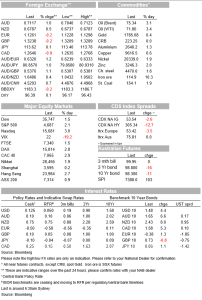Asset finance and leasing is in a growth phase in Australia as organisations seek a capital-effective way to modernise and upgrade across a broad range of asset classes and industries.


Markets continue to travel with optimism that Omicron will not have the severity of prior variants in terms of health outcomes, even if it is more transmissible.
Risk asset market remain in ebullient mood, US stocks coming into the last ‘hour of power’ with gains of more than 2% for the S&P 500 and 3% for the NASDAQ – the later despite a fresh lift in US risk-free rates and where the Treasury yield curve has (slightly) bear flattened, 2s currently +5bps on Monday’s New York close and 10s +4bps. Combined with the market’s take on yesterday’s RBA post-meeting Statement and smartly higher commodity prices, the risk-on mood sees AUD/USD adding to its local session gains, to a high of 0.7123.
Pending more definitive evidence in coming days and weeks, markets continue to travel with a good deal of optimism that Omicron will not have the severity of prior variants in terms of health outcomes even if it is more transmissible. Helpful to the cause here, overnight, the Norwegian Institute of Public Health has said “The Omicron variant is unlikely to cause more serious disease in vaccinated people…vaccination will provide a high degree of protection.” Also on a positive note, GSK and Vir Biotechnology said their COVID19 antibody drug “sotrovimab” was slightly weakened by Omicron, but that the difference was not significant. A Covid-19 vaccine from GlaxoSmithKline Plc and Canada’s Medicago Inc. demonstrated a high degree of efficacy (>70%) against multiple variants of the disease – though Omicron’s only recent emergence meant it wasn’t included in the study.
Reflective of the view Omicron will not necessitate large swathes of the global economy going back into lockdown – and too that China’s authorities will act to insure against broader economic contagion risks from the defaults now in motion among big Chines property developers – some commodity prices have been on a tear this week, notably oil and iron ore. On top of Monday’s near 5% gain for WTI crude , Tuesday has so far seen another 4% added to the price, though at $72 this is still more than $6 below where it was trading in late November – and further below its mid-November highs above $80 – before Omicron hit the headlines.
Iron ore futures have added another 3% (Dalian) and 2% (Singapore) to Monday’s gains, to put them up 10% and 13% respectively since the end of last week. News yesterday that Evergrande had missed the deadline for making a coupon payment on USD debt and seemingly triggering a wave of cross-defaults, has been seen as more cathartic than troublesome. With this particular boil lanced, the process already looks to be underway for local authorities taking control of Evergrande (and soon no doubt other big developers) and doing what’s necessary to protect domestic home buyers and suppliers, in doing so limiting broader contagion impacts. Other positive China news – on the heels of Monday’s RRR cut – has been yesterday’s November trade data showing imports up a much stronger than expected 31.7% y/y (consensus was for 21.5%).
In other commodity market news, dairy prices rose 1.4% at auction overnight, according to the GDT Price Index. This takes prices further above their 5-year average (now 29.4% above) and all of 33.6% above year earlier levels. Outright strength continues. Prices have pushed up to their highest since early-2014. Futures prices nevertheless fell slightly on the news, some in the market evidently expecting even better auction news.
The hard commodity price news has provided additional support to the AUD overnight, on top of that provided by Tuesday’s APAC session ‘risk-on’ mood and the RBA post-meeting Statement. On the latter, as well as upbeat comments at the top of the Statement regarding the near term economic outlook, the market picked up the comment that “The central forecast is for underlying inflation to reach 2½ per cent over 2023” – from “no higher than 2 ½% at the end of 2023” in the November Statement.
3-year AU bond futures saw the implied yield rise by 7.5bps during the local session and a further 6.5bps offshore – the latter at least partly in the context of a fresh rise in US front-end rates. The US yield curve has bear-flattened, with 2s +5.6bps on Monday’s new York close, 10s +4.4bps and the 30-year +2.3bps. The 3-year yield has traded above 1% for the first time since last Friday, with a significant concession (6bps) built in in front of the 3-year Note auction. A 10-year auction takes place tonight, 30-year on Thursday. Also to note, US Senate minority leader Mitch McConnel has just announced that a deal has been reached with Senate leader Chuck Schumer to extent the US debt ceiling beyond the reach of next November’s US mid-term elections.
AUD/USD lifted from around 0.7060 to 0.7080 in the immediate wake of the RBA Statement, and has pushed on to above 71 cents overnight (high of 0.7123) to be the best performing G10 currency (followed by NOK and CAD, up 0.8% and 0.7% respectively on latest oil price strength). In contrast the EUR can’t take a trick, nor too GBP, both off by 0.2% to see the DXY USD index up 0.1%. index. At 96.40, it is still about 0.5% shy of its 24 November year-to-date high.

Read our NAB Markets Research disclaimer
For further FX, Interest rate and Commodities information visit nab.com.au/nabfinancialmarkets
© National Australia Bank Limited. ABN 12 004 044 937 AFSL and Australian Credit Licence 230686.